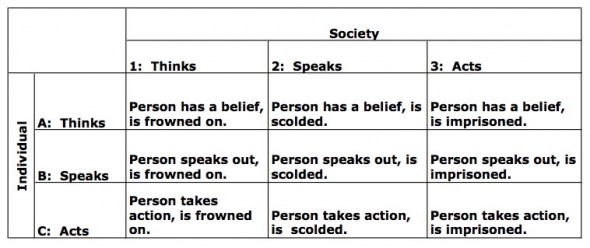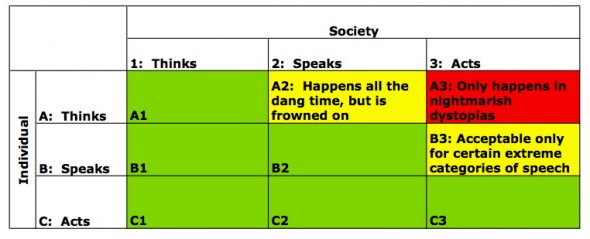This post started out as a comment responding to Fenzel’s response to my last post – or rather, to some of the conversations surrounding that conversation. Once it hit the 1,000 word mark and acquired a table, I realized that a comment thread was the wrong place for it (if only because I’d already used up all the time that I’d budgeted for Overthinking this week, and it’s my turn to post about something). Specifically, I’m responding to this:
“…expunging all objectionable images through social condemnation and censorship until an idea we don’t like simply doesn’t exist anymore sounds like a great idea when it’s your idea, but there are some pretty huge, massive, ginormous moral problems with anybody systematically doing this.”
The specific words again are Fenzel’s, from the comment thread, but they’re really just a convenient expression of an idea that’s pretty widespread. Censorship is bad, yeah? And stamping out ideas is probably even worse. People who try to control what you think are not mere censors, who after all only care what you say. The term that’s sometimes used is “thought police” — although none of our writers or commenters went there, which is just as well, because it’s such a loaded term that it’s almost a mini-Godwin event, signaling that rational debate is over and a shouting match can begin. Terminology aside, though, controlling what people say and think is not moral. This is just common sense.
And yet like all common sense, there’s more going on here than meets the eye.
Actions speak louder than words. And words speak louder than opinions in absence of words. So with any kind of ideological dispute between an individual and a larger group, we might want to consider whether either party is acting, speaking, or simply thinking. We can even make a table, like so.

For our purposes, it's convenient to imagine that the person goes first, and then society chooses a response. Obviously in real life it's a bit messier.
To give a suitably neutral example, let’s say that the individual is committed to the idea that chocolate chip cookies are delicious. The individual may simply leave their belief as a belief, falling into category A. Alternately, they may tell all their friends that chocolate chip cookies are delicious, write editorials extolling the deliciousness of chocolate chip cookies, or make food-porny paintings of really, really tasty-looking chocolate chip cookies, falling into category B. Most radically, they could do stuff like actually baking and eating chocolate chip cookies, or selling cookie-making paraphernalia, or handing cookies out on the street, or providing material assistance to the Keebler Eleves. A small but predictable number of bad apples will end up trying to burn down a pudding factory.
Society – which, for our purposes here, is chocolate-chip-cookie-averse – also has options. Since we don’t typically think of society as having “thoughts” as such, category 1 just describes a situation where liking chocolate chip cookies is rare enough that openly admitting a fondness for them marks you as kind of a weird dude, with all the subtle attendant consequences. If the Secretary of Cookies issues a press release stating that “Our nation is founded on certain core values, including the principal that a cookie is divinely ordained as a union between rolled oats, raisins, eggs, brown sugar, and cinammon,” it’s category 2. And if the possession of Tollhouse morsels is a class A felony carrying a minimum sentence of no fewer than five years, it’s category three.
According to our current understanding of how government should work, we tend to think that A should be met with 1, B with 2, and C with 3. Let’s pretend that instead of talking about cookies, we’ve been talking about marijuana. Distributing and selling it can get you imprisoned. Speaking in favor of marijuana can not, but will be met with ripostes from the Department of Health. What you believe about marijuana is no one’s business but your own… but if you believe that it’s the bees knees, you also believe that most people (or maybe just “most people”) would disapprove of your opinion. There are a few tricky areas where particularly extreme forms of speech can be met with actual punishment — incitement to violence, for instance, or child pornography, or false police reports. And societal groups of various kinds will pretty regularly respond to A with 2, telling people that it’s un-American not to support the troops, or that turning a blind eye to torture is itself morally equivalent to torture, or whatever. But it should be noted that, although it does happen pretty regularly, A2 is usually seen as a dick move, and often will be met with disapproval both from across the aisle and from the moderate wing of one’s own faction.
Far more troubling, however, is A3, where individuals can wind up in jail or in front of a firing squad just because of their beliefs. In a situation like this, merely thinking something has become a criminal act. And this is where the Orwellian term “thoughtcrime” comes in. If we felt it necessary, we could supplement that term with “speechcrime” and “actcrime,” although these are typically covered by the unmarked term “crime.” (Incidentally, the few kinds of speech that are straight-up illegal in modern American society tend to be parsed as a kind of act for legal purposes. Copyright infringement, for instance, is not a special kind of speech: it is a special kind of thievery. Shouting fire in a crowded theater is prohibited specifically because it will cause actions that the government has a right to prevent, such as the trampling of people to death. Slander and libel need to have demonstrably caused harm, which means that they are not, per the landmark decision in Sticks v. Stones, merely words.)
If we think of there being three different kinds of crime, then there would also be three different kinds of law enforcement. The regular police (who just about everyone approves of save for anarchists and N.W.A.), spend most of their time dealing with illegal acts. Censors, seen as a necessary evil at best, prevent and punish illegal speech. And the term “thought police” applies to people who spend their time preventing and punishing illegal thoughts. Well… kinda sorta. But it doesn’t actually work that way.


Your point that we need to accept words as they’re intended to be used, at least provisionally, is well-taken, but hard for me to square with some of my big issues with “censorship” arguments. When a company fires somebody for a racist remark made on-air, people routinely call it “censorship,” and this drives me crazy, because calling this behavior “censorship” automatically implies a whole web of implications: that the company is being fascistic, that the speaker is being oppressed, etc etc. That’s why I always fall back on a certain technical definition of censorship at that moment: censorship is the control of speech by authoritarian, coercive force — the type of force upon which the government has a monopoly. A company, on the other hand, has every right to have standards of decency and respect for its employees, and especially for its product — and its product is the speech these employees are generating. The company has every right to fire people who make outrageous, disrespectful, or offensive statements; if there’s anything the market should be discouraging, its outrageous and disrespectful and conflict-causing behavior.
It’s the basic liberal-democratic idea of government I’m working from, I guess… the government should stand outside the market, providing regulations to prevent abuse, and deterring violence that undercuts social cohesion — i.e. violence without due process. It shouldn’t control speech, except speech that’s clearly intended to incite such violence. But once you’ve given the government its job and its limitations, speech should be subject to the rules of the communities and markets that are affected by it. If some of those markets use non-violent means to punish certain speech acts, then so be it. That’s how we regulate behavior in our morally ambiguous, fuzzy-logic society.
That said: among all the provocative types of public speech, informed criticism, whether ideologically-oriented or clinically detached, is one of the best types of speech. If people are making strong, intelligibly arguments, I don’t care what side they’re on or how vehement they’re being about their loyalty. What we need to be nervous about is ill-informed criticism, analysis that isn’t aware of its context, critiques that don’t respect basic logical distinctions, etc. That shit just muddies up the discourse, and as people have more access to anonymous forums, they’re more prone to this type of bad rhetoric.
I have the same issues with censorship arguments that you do – but note that if we really limit ourselves to the technical definition of censorship, it shouldn’t imply all the value judgements that (as you quite rightly say) it does in practice. It’s not just fascist governments that censor, after all, and not everyone who is censored is oppressed in any meaningful way. One can’t defend oneself against charges of censorship by pointing out that there are all kinds of censorship that are morally responsible, or at least reasonable (such as the practice of removing references to troop movements from soldiers’ correspondence during wartime, etc.). Implicit in the charge of censorship is the idea that censorship is evil, and I feel like that needs to be part of our working definition of the term.
So three articles that either directly or indirectly deal with Casandra type characters and nobody has mentioned Randy Quaid in Independence Day… for shame. Seriously though, this has been really good stuff. Keep it up.
Is the idea that we’d rather imagine that there’s no differene between state/government and the collective will of society – like it’s some sort of ghost that does our will with the magic spell of democracy? So we wilfully delude ourselves that there’s no x-axis on this diagram?
If you found the way people thought and spoke about this a little irritating on december 1, I can’t imagine how you’re feeling now that cabelgate has busted.